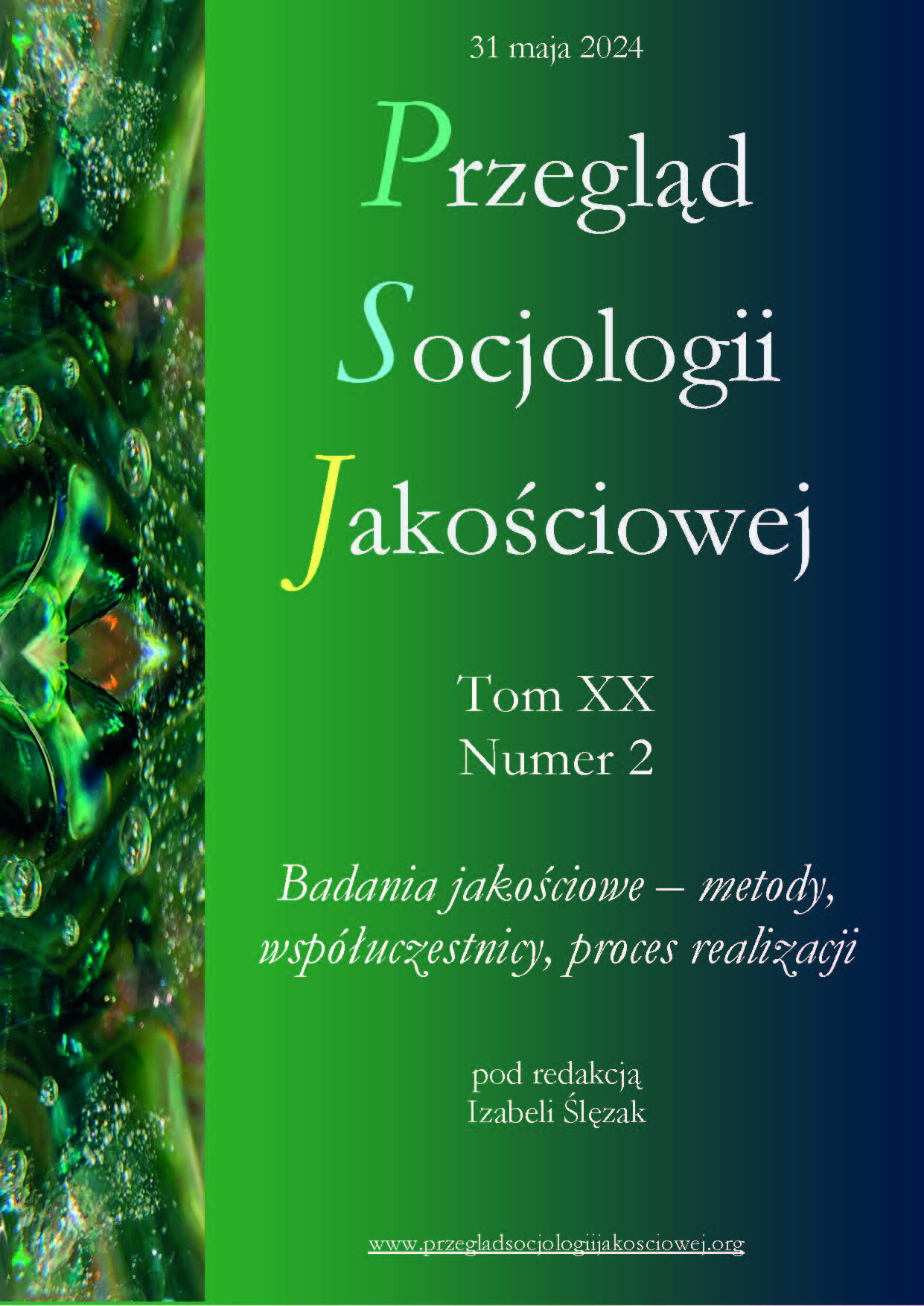Ontologia dziedzinowa. Nowa metoda mapowania pola jakościowych praktyk badawczych
DOI:
https://doi.org/10.18778/1733-8069.20.2.06Słowa kluczowe:
metaanaliza, badania jakościowe, systematyzacja wiedzy, ontologia dziedzinowa, słownikowa analiza treściAbstrakt
Już w latach dziewięćdziesiątych pojawiła się opinia, że obszar badań jakościowych cierpi na „klątwę urodzaju”. Zjawisko to przybiera na sile wraz z dynamicznym rozwojem różnych wariantów metodologii, metod i technik badawczych. Badacze jakościowi napotykają trudności na różnych etapach swojej kariery i dostrzegają potrzebę uporządkowania wiedzy na temat współczesnych wariantów badawczych praktyk jakościowych. Niniejszy artykuł odpowiada na tę potrzebę, prezentując model pola współczesnych badań jakościowych, oparty na koncepcji informatycznej ontologii dziedzinowej. Model ten został opracowany na podstawie wielowymiarowej analizy treści pięciu kluczowych czasopism metodologicznych i przedstawiony w formie sieci semantycznej. Dla porządku wyodrębniono trzy obszary: podejścia epistemologiczne, metody zbierania i analizy danych, które sklasyfikowano w 369 klasach ontologicznych. Ponadto model ukazuje skupiska i zależności między tymi elementami oraz wskazuje na istnienie trzech podobszarów, które charakteryzują się różnymi podejściami i metodami badawczymi, różniącymi się gęstością i siłą zależności. Ten ontologiczny model współczesnego pola badań jakościowych stanowi istotny krok w kierunku opracowania bazy wiedzy na temat tej dziedziny. Może on służyć jako system informacyjny do organizacji metodologicznej wiedzy, monitorowania trendów, zarządzania wiedzą oraz skutecznego wykorzystania jej w praktyce badawczej i dydaktycznej, poszerzając spojrzenie na dostępne praktyki i zwiększając pewność wśród badaczy do zastosowania różnych podejść w zbieraniu danych i analizie.
Pobrania
Bibliografia
Archibald Mandy, Radil Amanda, Zhang Xiaozhou, Hanson William (2015), Current Mixed Methods Practices in Qualitative Research: A Content Analtextysis of Leading Journals, “International Journal of Qualitative Methods”, vol. 14(2), pp. 5–33, https://doi.org/10.1177/160940691501400205
Google Scholar
Atkinson Paul (2005), Qualitative Research – Unity and Diversity, “Forum Qualitative Sozialforschung/Forum: Qualitative Social Research”, vol. 6(3), https://doi.org/10.17169/fqs-6.3.4
Google Scholar
Bryda Grzegorz (2014), CAQDAS, Data Mining i odkrywanie wiedzy w danych jakościowych, [in:] J. Niedbalski (ed.), Metody i techniki odkrywania wiedzy. Narzędzia CAQDAS w procesie analizy danych jakościowych, Łódź: Wydawnictwo Uniwersytetu Łódzkiego, pp. 13–40.
Google Scholar
Bryda Grzegorz (2019), From CAQDAS to Text Mining. The Domain Ontology as a Model of Knowledge Representation About Qualitative Research Practices, [in:] P.A. Costa, L.P. Reis, A. Moreira (eds.), Computer Supported Qualitative Research, New Trends on Qualitative Research, Berlin–Heidelberg: Springer, pp. 72–88, https://link.springer.com/chapter/10.1007/978-3-030-31787-4_6 (accessed: 1.09.2023).
Google Scholar
Bryda Grzegorz (2020), Whats and Hows? The Practice-Based Typology of Narrative Analyses, “Przegląd Socjologii Jakościowej”, vol. XVI, no. 3, pp. 120–142, https://doi.org/10.18778/1733-8069.16.3.08
Google Scholar
Bryda Grzegorz, Tomanek Krzysztof (2014), Od CAQDAS do Text Miningu. Nowe techniki w analizie danych jakościowych, [in:] J. Niedbalski (ed.), Metody i techniki odkrywania wiedzy. Narzędzia CAQDAS w procesie analizy danych jakościowych, Łódź: Wydawnictwo Uniwersytetu Łódzkiego, pp. 191–218.
Google Scholar
Chenail Ronald J. (2009), Communicating Your Qualitative Research Better, “Family Business Review”, vol. 22(2), pp. 105–108.
Google Scholar
Denzin Norman, Lincoln Yvonna (eds.) (1994), Handbook of Qualitative Research, Thousand Oaks: Sage.
Google Scholar
Denzin Norman, Lincoln Yvonna (eds.) (2005), The SAGE Handbook of Qualitative Research, Third Edit, Thousand Oaks: Sage.
Google Scholar
Denzin Norman, Lincoln Yvonna (eds.) (2011), The SAGE Handbook of Qualitative Research, Fourth Edi, Thousand Oaks: Sage.
Google Scholar
Duevel Casey (2019), SAGE Research Methods, “The Charleston Advisor”, vol. 19(4), pp. 38–41, https://doi.org/10.5260/chara.19.4.38
Google Scholar
Gruber Thomas (1993), A Translation Approach to Portable Ontology Specifications, “Knowledge Acquisition”, vol. 5(2), pp. 199–220.
Google Scholar
Helbig Hermann (2006), Knowledge Representation and the Semantics of Natural Language, Berlin–Heidelberg: Springer Verlag.
Google Scholar
Jurafsky Daniel, Martin James (2009), Speech and language processing: An introduction to natural language processing, computational linguistics, and speech recognition, New Jersey: Pearson Prentice Hall.
Google Scholar
Knoblauch Hubert, Flick Uwe, Maeder Christoph (2005), Qualitative Methods in Europe: The Variety of Social Research, “Forum Qualitative Sozialforschung”, vol. 6(3), https://doi.org/https://doi.org/10.17169/fqs-6.3.3
Google Scholar
Lester Jessica Nina, O’Reilly Michelle (2015), Is Evidence-Based Practice a Threat to the Progress of the Qualitative Community? Arguments From the Bottom of the Pyramid, “Qualitative Inquiry”, vol. 21(7), pp. 628–632.
Google Scholar
Lim Soo-Yeon, Song Mu-Hee, Lee Sang-Jo (2004), The Construction of Domain Ontology and Its Application to Document Retrieval, [in:] T. Yakhno (ed.), Advances in Information Systems. ADVIS 2004, “Lecture Notes in Computer Science”, vol. 3261, Berlin–Heidelberg: Springer, pp. 117–127, https://doi.org/10.1007/978-3-540-30198-1_13
Google Scholar
Munn Katherine, Smith Barry (2008), Applied Ontology: An Introduction, Frankfurt: Ontos Verlag.
Google Scholar
Newman Mark, Barabási Albert-László, Watts J. Duncan (eds.) (2006), The Structure and Dynamics of Networks, New Jersey: Princeton University Press.
Google Scholar
Quillian M. Ross (1968), Semantic memory, [in:] M. Minsky (ed.), Semantic information processing, Cambridge: MIT Press, pp. 216–270.
Google Scholar
Ravenek Michael John, Rudman Debbie Laliberte (2013), Bridging Conceptions of Quality in Moments of Qualitative Research, “International Journal of Qualitative Methods”, vol. 12(1), pp. 436–456.
Google Scholar
Sandelowski Margarete, Barroso Julie (2003), Classifying the Findings in Qualitative Studies, “Qualitative Health Research”, vol. 13(7), pp. 905–923.
Google Scholar
Short Jeremy C., McKenny Aaron F., Reid Shane W. (2018), More Than Words? Computer-Aided Text Analysis in Organizational Behavior and Psychology Research, “Annual Review of Organizational Psychology and Organizational Behavior”, vol. 5(1), pp. 415–435, https://doi.org/10.1146/annurev-orgpsych-032117-104622
Google Scholar
Taylor Chris, Coffey Amanda (2009), Editorial – Special Issue: Qualitative Research and Methodological Innovation, “Qualitative Research”, vol. 9(5), pp. 523–526.
Google Scholar
Travers Max (2009), New Methods, Old Problems: A Sceptical View of Innovation in Qualitative Research, “Qualitative Research”, vol. 9(2), pp. 161–179.
Google Scholar
Wang Dashun, Barabási Albert-László (2021), The Science of Science, Cambridge: University Press.
Google Scholar
Wiedemann Gregor (2013), Opening up to Big Data: Computer-Assisted Analysis of Textual Data in Social Sciences, “Forum Qualitative Sozialforschung/Forum: Qualitative Social Research”, vol. 14(2), https://doi.org/10.17169/fqs-14.2.1949
Google Scholar
Wiles Rose, Crow Graham, Pain Helen (2011), Innovation in Qualitative Research Methods: A Narrative Review, “Qualitative Research”, vol. 11(5), pp. 587–604.
Google Scholar
Opublikowane
Wersje
- 2024-07-10 - (2)
- 2024-05-31 - (1)
Jak cytować
Numer
Dział
Licencja

Utwór dostępny jest na licencji Creative Commons Uznanie autorstwa – Użycie niekomercyjne – Bez utworów zależnych 4.0 Międzynarodowe.














